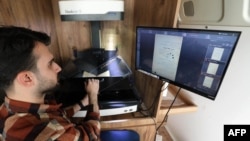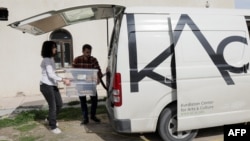Rebin Pishtiwan huddles in the back of a van, carefully scanning the yellowing pages of a book as part of his mission to digitize books on Kurdish history that are at risk of disappearing.
The Kurds are considered the largest stateless people in the world, with a population of between 25 million and 35 million, mainly distributed in today’s Iraq, Iran, Syria and Turkey.
The Kurds are a sizable persecuted minority in Iraq, with thousands killed and many of their historical documents lost or destroyed under the late dictator Saddam Hussein.
“Preserving the culture and history of Kurdistan is a sacred task,” said Pistivan, who pored over books and manuscripts from the public library of Dohuk, a city in the autonomous Kurdistan region of northern Iraq.
“Our goal is to digitize rare and fragile old books so they don’t disappear,” added the 23-year-old, holding a torn memoir of a Kurdish teacher published in 1960.
The Kurdish language was mostly marginalized in Iraq until the autonomous Kurdish region in the north won greater freedoms after Saddam Hussein’s defeat in the 1990-1991 Gulf War.
After the U.S.-led invasion toppled the dictator in 2003, the remaining documents were scattered in libraries and universities or in private collections.
Once a week, Pishtivan and two of his colleagues travel in a white minivan from the regional capital Erbil to other Kurdish towns in search of “rare and ancient” books.
They looked for texts that offered insight into Kurdish life across centuries and dialects.
In Dohuk’s library, an archiving team searches wooden bookshelves for hidden gems.
With the help of the library manager, they have carefully collected more than 35 books on poetry, politics, language and history, written in various Kurdish dialects and some Arabic.
Pištivan held up a book of ancient Kurdish folktales named after the 16th-century Kurdish princess Xanzad, then gently flipped through the fragile pages of another religious book, tracing calligraphy with his fingers.
Back in the car, equipped with two devices connected to screens, the small team began the hours-long process of scanning and then returning the books to the library.
Lacking an online archive, the Kurdistan Center for Arts and Culture, a nonprofit founded by the nephew of regional president Nechirvan Barzani, launched a digitization project in July.
They hope to make the texts freely available to the public on KCAC’s new website in April.
To date, more than 950 items have been archived, including a collection of manuscripts from the Kurdish Baban principality in today’s Sulaymaniyah region, dating back to the 1800s.
“The intention is to provide a primary resource for Kurdish readers and researchers,” said KCAC Executive Director Mohammed Fatih. “This archive will become the property of all Kurds to use and help advance our understanding of ourselves. “
Dohuk Library Manager Masoud Khalid gave the KCAC team access to manuscripts and documents gathering dust on the shelves, but the team was unable to get permission from some document owners to digitize them immediately.
“We have books that were printed a long time ago — their owners or authors passed away — and the publishers won’t reprint them,” Khalid said.
The 55-year-old added that digitizing the collection means “if we want to open an electronic library, our books are already there”.
Hana Kaki Hirane, the imam of a mosque in the town of Hirane, unveiled a treasure to the KCAC team – several generations of manuscripts from a religious school built in the 1700s.
The school has collected manuscripts since its founding, but many were destroyed during the first war between the Kurds and the Iraqi government from 1961 to 1970, Hirane said.
“Today only 20 manuscripts remain,” the imam said, including centuries-old poems.
He is now waiting for the KCAC website to go live in April to direct people to the manuscript.
“It’s time to get them out and make them available to everyone,” he said.
Follow us on Google news ,Twitter , and Join Whatsapp Group of thelocalreport.in


















